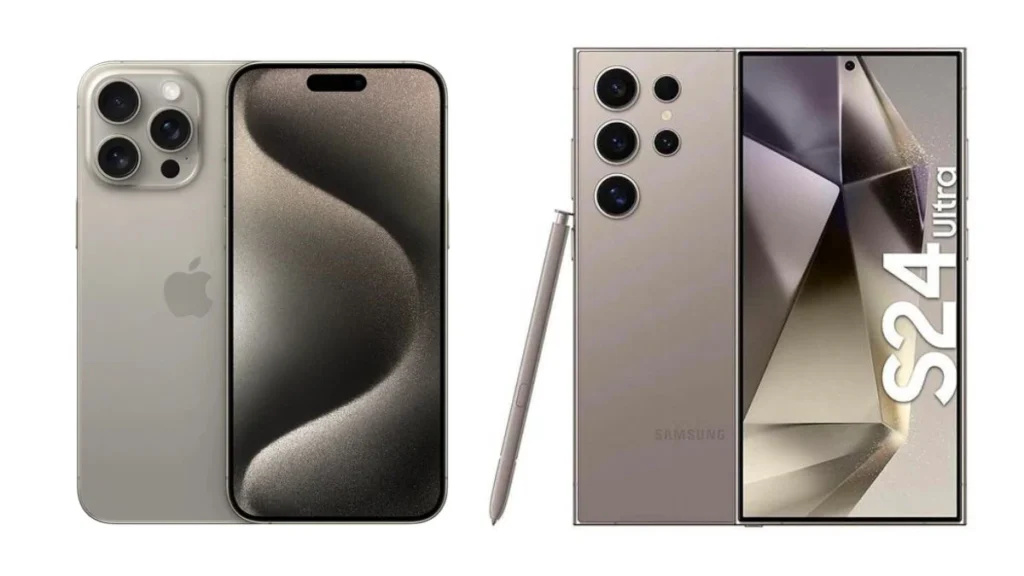The rivalry between Samsung and Apple in the smartphone industry is nothing short of legendary, akin to the age-old clash of Coke versus Pepsi or Marvel versus DC. Both companies consistently unveil cutting-edge devices, each boasting its own legion of dedicated fans.
Samsung vs. Apple: The Epic Showdown of Smartphone Giants
While determining which is “better” ultimately hinges on individual preferences and priorities, a comparative analysis of key aspects can certainly aid in making an informed decision.
Design and Construction Quality
Samsung: Renowned for its sleek designs featuring curved edges and vibrant displays, Samsung’s smartphones exude elegance. Praised for its use of premium materials like glass and metal, devices such as the Samsung Galaxy S21 Ultra showcase stunning designs coupled with versatile camera setups.
Apple: Apple’s hallmark lies in minimalist and sophisticated designs. The iPhone series boasts exceptional build quality with premium materials like aluminum and glass. The iPhone 13 Pro, featuring a Ceramic Shield front cover, epitomizes Apple’s dedication to durability.
Operating System
Samsung: Samsung smartphones operate on the Android operating system with the company’s One UI skin overlay. Android offers extensive customization options and seamless integration with Google services. Over the years, Samsung’s One UI has evolved to provide users with a more intuitive experience.
Apple: iPhones run on Apple’s iOS, celebrated for its simplicity, security, and seamless synergy with other Apple devices and services. The iOS ecosystem, tightly controlled by Apple, ensures consistent software updates and a unified user experience.
Performance
Samsung: Flagship Samsung devices, including the Galaxy S and Note series, boast powerful processors such as the Exynos or Snapdragon chips (depending on the region). These devices deliver exceptional performance for multitasking, gaming, and productivity.
Apple: iPhones are powered by Apple’s custom-designed A-series chips, renowned for their top-tier performance and energy efficiency. The A15 Bionic chip in the iPhone 13 series maintains this legacy, offering swift and seamless performance.
Camera Technology
Samsung: Samsung smartphones have made significant advancements in camera technology. Devices like the Galaxy S21 Ultra boast versatile camera systems with impressive zoom capabilities and 8K video recording capabilities.
Apple: Apple’s iPhone cameras consistently deliver exceptional photo and video quality. The iPhone 13 Pro models feature improved low-light photography and ProRAW capabilities catering to advanced photographers.
Ecosystem and Integration
Samsung: While Samsung offers a diverse range of products including smart TVs, smartwatches, and tablets that can integrate with their smartphones, their ecosystem may not be as tightly integrated as Apple’s.
Apple: Apple excels in creating a seamless ecosystem with devices like the Apple Watch, iPad, and Mac. Features like AirDrop, iCloud, and Handoff facilitate effortless cross-device integration.
Price Range
Samsung: With a broader range of smartphones, including more budget-friendly options, Samsung makes its devices accessible to a wider audience. Flagship models can often compete with Apple’s high-end counterparts in terms of pricing.
Apple: Apple’s iPhones tend to be pricier, particularly their flagship models. While they offer premium features, this exclusivity comes at a premium price.
In Conclusion
The battle between Samsung and Apple smartphones persists, driven by innovation and consumer preferences. Each company has its strengths, catering to different needs and tastes. Samsung shines in customization, versatility, and affordability, while Apple excels in delivering a seamless ecosystem, exceptional build quality, and a reputation for security.
Ultimately, the choice between Samsung and Apple hinges on individual needs and preferences. Are you drawn to customization and affordability, or do you prioritize a seamless ecosystem and premium design? The answer lies in personal preferences, making both Samsung and Apple victors in their own right in the ever-evolving realm of smartphones.
